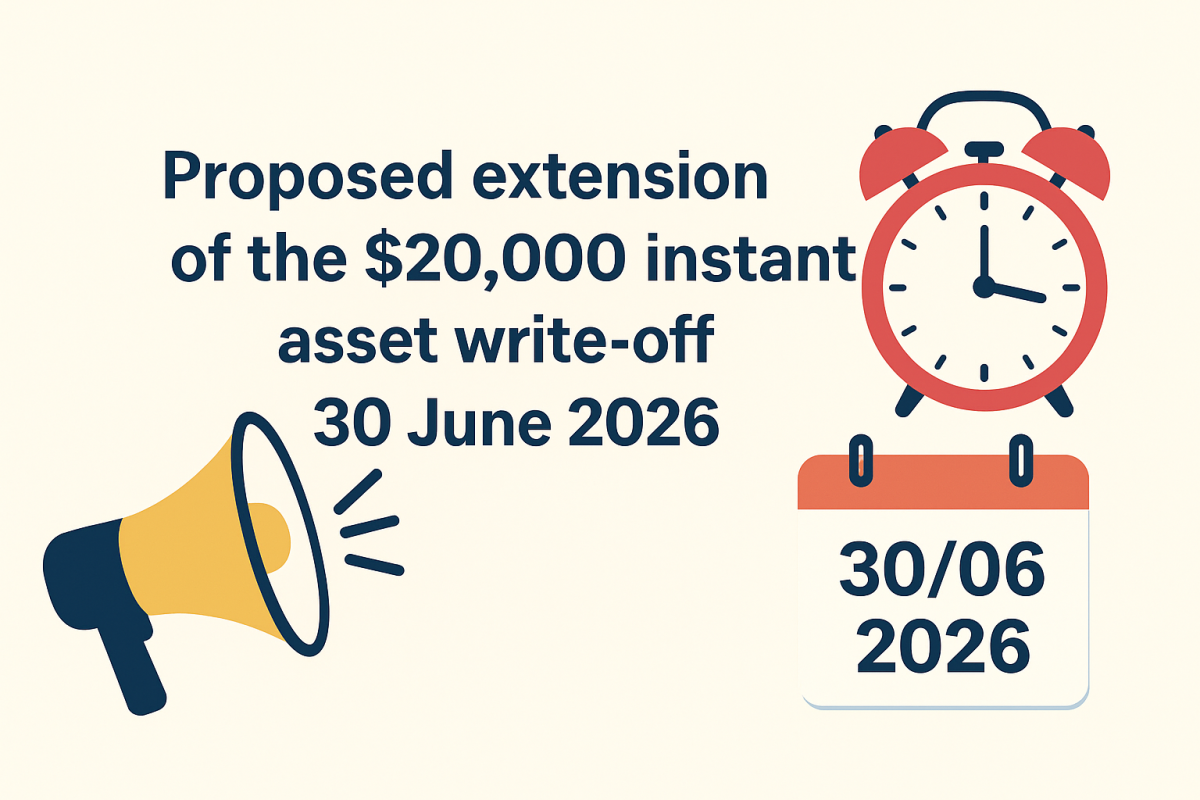A new Bill currently before Parliament — the Treasury Laws Amendment (Strengthening Financial Systems and Other Measures) Bill 2025 — outlines several changes that may affect small businesses, listed companies, and the not-for-profit sector. The most widely anticipated proposal is the extension of the $20,000 instant asset write-off for an additional year, through to 30 June 2026.
Instant Asset Write-Off: Extended Support for Small Businesses
If passed, the measure would allow small businesses with an aggregated annual turnover below $10 million to continue claiming an immediate deduction for eligible assets costing less than $20,000 (excluding GST). The threshold applies on a per-asset basis, meaning businesses can claim multiple deductions as long as each item falls under the limit.
To qualify, the asset must be first used or installed ready for use by 30 June 2026. This write-off remains one of the most practical tax incentives available, as it allows the full deduction in the year of purchase rather than spreading depreciation over several years. For many businesses, this helps manage cash flow and supports investment in tools, equipment, or technology upgrades. A tradesperson replacing tools or a café acquiring kitchen equipment, for example, can claim the deduction upfront and redeploy cash into other parts of their operations.
Although the measure is still before Parliament, now is a good time to plan ahead. Businesses considering upgrades or new acquisitions should ensure that lead times, delivery schedules, and installation timing align with the proposed deadline should the Bill be enacted.
Stronger Disclosure Obligations for Listed Companies
The Bill also introduces reforms to the Corporations Act 2001 by requiring the disclosure of equity derivative interests — including options, swaps, and short positions — under the substantial holding regime. The intention is to enhance market transparency and reduce the likelihood of control interests being obscured through complex derivative arrangements.
For listed entities, these reforms will likely increase compliance requirements and may necessitate updates to internal monitoring and reporting systems. Investors with substantial positions should also review their existing arrangements to ensure they remain compliant under the proposed rules.
Greater Transparency in the Charity Sector
For not-for-profits, the Bill proposes granting the ACNC Commissioner the authority to publicly disclose certain “protected information” where a public harm test is met. This shift aims to strengthen public confidence by demonstrating that regulatory action is being taken where misconduct is identified.
For compliant and well-run charities, increased transparency can reinforce community trust. However, it also highlights the importance of robust governance, accurate record-keeping, and a clear understanding of regulatory obligations.
Changes to Oversight of Financial Regulators
The Bill would also reduce the frequency of reviews of ASIC and APRA conducted by the Financial Regulator Assessment Authority, shifting from a two-year to a five-year cycle. While largely administrative, this change reflects a move toward streamlined oversight, giving regulators more room to focus on core responsibilities rather than frequent review processes.
Planning Ahead
Although these measures are not yet law, it may be helpful to prepare early:
- Small businesses should evaluate upcoming capital expenditure and consider whether planned purchases would benefit from the instant asset write-off if the extension is enacted.
- Listed companies may want to assess whether their reporting systems can accommodate expanded disclosure requirements.
- Charities and not-for-profits should review their governance procedures to ensure they are equipped for an environment with greater transparency and potential public disclosures.
We will continue to monitor the progress of the Bill. If you would like tailored guidance on how these changes may affect your organisation or investment plans, feel free to reach out.
Pitt Martin Group is a firm of Chartered Accountants, providing services including taxation, accounting, business consulting, self-managed superannuation funds, auditing and mortgage & finance. We spend hundreds of hours each year on training and researching new tax laws to ensure our clients can maximize legitimate tax benefit. Our contact information are phone +61292213345 or email info@pittmartingroup.com.au. Pitt Martin Group is located in the convenient transportation hub of Sydney’s central business district. Our honours include the 2018 CPA NSW President’s Award for Excellence, the 2020 Australian Small Business Champion Award Finalist, the 2021 Australia’s well-known media ‘Accountants Daily’ the Accounting Firm of the Year Award Finalist and the 2022 Start-up Firm of the Year Award Finalist, and the 2023 Hong Kong-Australia Business Association Business Award Finalist.
Pitt Martin Group qualifications include over fifteen years of professional experience in accounting industry, membership certification of the Chartered Accountants Australia and New Zealand (CA ANZ), membership certification of the Australian Society of Certified Practising Accountants (CPA), Registered Australia Tax Agents, certified External Examiner of the Law Societies of New South Wales, Victoria, and Western Australia Law Trust Accounts, membership certification of the Finance Brokers Association of Australia Limited (FBAA), Registered Agents of the Australian Securities and Investments Commission (ASIC), certified Advisor of accounting software such as XERO, QUICKBOOKS, MYOB, etc.
This content is for reference only and does not constitute advice on any individual or group’s specific situation. Any individual or group should take action only after consulting with professionals. Due to the timeliness of tax laws, we have endeavoured to provide timely and accurate information at the time of publication, but cannot guarantee that the content stated will remain applicable in the future. Please indicate the source when forwarding this content.
By Yvonne Shao @ Pitt Martin Tax

